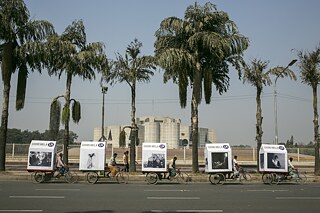How can biennials and festivals become more inclusive? This question lies at the core of the project “Learning from Others - Where the Twain Meets“, jointly conceived by the Biennale für aktuelle Fotografie and its curatorial team and advisors, together with Chobi Mela.
Comprised of three distinct strands, each with different partners, the project acts as an invitation to explore and experiment, to create moments of dialogue, shared knowledge production, solidarity, and celebration. The project initiates new collaborations with photo collectives, community-oriented cultural platforms, and social initiatives. In doing so, the participating initiatives are invited to explore confluences, overlaps, and solidarities across their diverse and innovative models, creating a space for mutual co-learning, knowledge exchange, and generative conversations, facilitated within the framework of the Biennale.
The project further asks how biennials and festivals can attend to the needs of those they invite to exhibit and collaborate with. Emerging from conversations with project partner and curatorial advisor yasmine eid-sabbagh (Burj al-Shamali Archive), one such enquiry considers how invitations might inadvertently become burdens. Here the project seeks to explore strategies that centre process alongside outcome, thinking about how the structure of the Biennale can support the ongoing creative labour of its partners, both through and beyond the timeline of an exhibition project.
Similarly, dialogues with project partners Market Photo Workshop (Johannesburg) highlight the importance of taking a place-responsive approach to decolonising photographic education, alongside the challenges of striking a balance between creating intimate, experiential spaces of learning that nonetheless align with the needs of the market that students must navigate upon graduation. These perspectives will feed into further dialogues with Pathshala South Asian Media Institute (Dhaka) as the two institutions collaborate on developing a joint educational module, to be delivered in a collaborative workshop format later in 2024.
Crossing geographical, cultural, and political boundaries, the project brings together practitioners and thinkers from different fields to discuss diverse cultural practices. By rethinking the relationships between artist and institution, process and outcome, as well as broader ideas of hospitality and collectivity, the project creates spaces where plurality and diversity are celebrated rather than feared.
